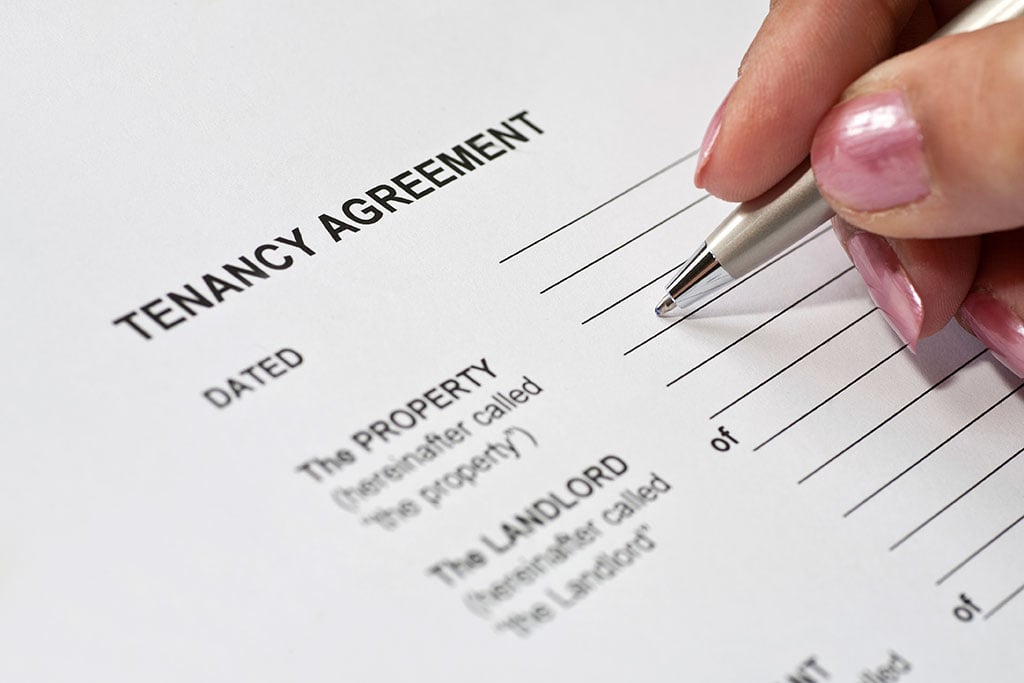A tenancy agreement (TA) is the more detailed, legally binding version of the letter of intent (LOI). The document states the rental terms agreed by the landlord and tenant. It also sets out each party’s rights and obligations with regards to the tenancy. Ordinarily, the landlord — or the property agent of the landlord — prepares the tenancy agreement in accordance with the LOI.

Note that the TA is more important than the LOI, and must be read in close detail. If there are legal disputes, the final outcome hinges on this document.
The Council for Estate Agencies (CEA) now provides a standardised template of the rental agreement that you can use. As such, we now expect that most tenancy agreements in Singapore will be based on these samples that you can download:
- HDB flats
- Private property
You are advised to have a property agent of your own to go through the TA, at least for your first time as a tenant in Singapore.
Security deposit
In Singapore, the signing of the rental agreement is often concurrent with your handing over of the security deposit.
By convention (not law), the security deposit is one month’s rent for a one-year lease, or double that for a two-year lease. It will be refunded at the end of the lease, after deductions due to damages.
If there is any damage to the property besides fair wear and tear, the landlord can subtract the cost of damages from your security deposit. In general, the deposit is only used to cover damages for which you are directly responsible. A leak caused by an old kitchen pipe won’t be deducted from your deposit, but a hole in the wall from a wild party will be.
If there’s a premature termination of the lease — and no clause in the TA permits such a termination — your security deposit can be withheld. In short, breaking the lease causes you to forfeit the deposit.
For a more detailed account on the security deposit, see our Good Faith Deposit vs Security Deposit Guide.
What’s in a tenancy agreement?
If the CEA template is not being used, all rental agreements should include the following information:
- Full name and contact address of the landlord and tenant
- Address of the property to be rented
- The date the TA is signed
- Lease period, including the starting and end dates of the tenancy
- Addresses for service for both the landlord and the tenant
- The rent amount and frequency of payments
- Payment mode and the account to which payment is to be made
- Any fees to be paid (eg. commission for property agents)
- Inventory list of all the items in the apartment
What to look out for in a rental tenancy agreement in Singapore?
In addition to the above, many rental contracts in Singapore include clauses regarding:
- Payment for utilities (find out if this is included in the rent; if yes, find out if it includes internet access — some agreements only cover water and electricity)
- Insurance matters (note that the landlord’s home content insurance may not extend to cover tenants)
- Applicable stamp duties
- Conditions of access to premises (this states when and how your landlord can enter the house during the lease period)
- Any regular servicing schedules, such as air-conditioner servicing or gardening (for landed properties)
- Conditions of the security deposit and good faith deposit
- Termination clauses
- Details of what happens if rent is paid late or not at all.
(If you’re looking to rent a place in Singapore, browse the latest rooms for rent on 99.co or the latest property for rent in Singapore!)
Here are some clauses to pay special attention to.
1. Diplomatic Clause and Reimbursement Clause (Early Termination of Lease)
Expatriates should insist on this clause. This lets you terminate the lease prematurely if you lose your job or are transferred to another country.
Usually, the clause can be exercised after you are 12 months into a two-year lease. It allows you to terminate the contract without having to pay the additional months of rent.
By convention, a notice period of two months will be stated in the clause.
If you require the landlord to include the Diplomatic Clause, it is not unusual for a Reimbursement Clause to be included. This stipulates that you have to reimburse a part of the property agent’s commission.
You can find out more about early termination of lease agreements in our guide here.
For more information on common commission rates and responsibilities check out our agent commission guide.
2. Minor Repair Clause and Other Maintenance Clause
This clause states how much you are liable to pay, for damage caused by wear and tear (damage from direct negligence is deducted from the security deposit). By convention, tenants pay the first S$150 for fixing any wear and tear, while the landlord covers the rest.
For instance, the washing machine requires repairing and it costs S$200. As a tenant, you’ll have to pay the first S$150, while your landlord will cover the remaining S$50.

We advise all tenants to insert a problem-free period clause in the tenancy agreement, preferably 30 days or more. This way you are not liable for any damages during the initial period of the lease. It also protects you from damages caused by the previous tenant.
3. Option to Renew Clause
This is a clause that lets tenants extend the lease for another term — usually a year — with a two-month prior notice. If the clause is exercised, the landlord will prepare a contract for an extension. The clauses stay the same as the current contract unless specified otherwise.
4. Access to Premises Clause
There are usually a series of “Access to Premises” clauses, allowing landlords to enter the premises for a stated purpose. Typically, the purposes for which a landlord would enter the premises is for repair work or viewings for future tenants.
Towards the end of your lease, the landlord may arrange for viewings to minimise the vacancy period of the unit.
5. En Bloc Clause
This clause states that, if there is a collective sale of the development, the landlord can sell the property and prematurely terminate your lease without compensation. En bloc sales are passed by a majority of the development’s owners, so your landlord has to sell the property regardless of whether he wants to or not.
This is a risk to take seriously when renting very old leasehold properties, such as those that are past 30 or 40 years in age. Given how long it takes an en bloc to proceed, however, it’s probable that your lease will be over long before you need to vacate the property.
—
If you found this article helpful, 99.co recommends Guide to breaking lease and early termination of tenancy agreement in Singapore and 7 things Singapore landlords MUST DO to survive 2021.
Looking for a property? Find the home of your dreams today on Singapore’s fastest-growing property portal 99.co! If you would like to estimate the potential value of your property, check out 99.co’s Property Value Tool for free. Meanwhile, if you have an interesting property-related story to share with us, drop us a message here — and we’ll review it and get back to you.
Frequently asked questions
Can I write my own tenancy agreement?
Technically, yes, you can do that. You may also refer to the tenancy agreement samples on the CEA website to write your own rental contract.
Can I download a tenancy agreement?
Yes, you can download a template of the tenancy agreement used in Singapore from the CEA website.
How to e-stamp the tenancy agreement?
You can do so online through the IRAS e-Stamping Portal and login with your SingPass. You’ll then be prompted to fill in the necessary information and pay the tenancy agreement stamp duty. You can make the payment by GIRO, eNETS or other payment methods like FAST and AXS.
The post Tenancy agreement and security deposit in Singapore: What renters must know appeared first on 99.co.

